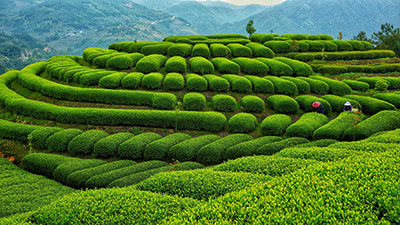
- HOME
- Market And Trade
- Market And Trade
Distinctive Liupao tea finds a global growth flavor
Liupao tea, which originated in Wuzhou, has long been popular in overseas Chinese communities. Its fame grew significantly overseas in the second half of the 19th century among Chinese migrants in Southeast Asia, who used it as a herbal remedy in the hot, humid climate.
Over a century ago, Liupao tea was one of the major commodities exported along the old maritime Silk Road to Southeast Asian countries, including Malaysia.
Recent growth in the tea sector is about to expand in traditional overseas markets, said Qin Jialiang, manager of the international sales department at China Tea (Wuzhou), which specializes in exporting Liupao tea to markets such as Malaysia, Singapore and Japan.
The annual output of the Wuzhou-based company reached 3,000 metric tons in 2022, a year-on-year increase of 20 percent, and its output value was about 16 billion yuan ($2.2 billion) last year, a year-on-year rise of over 45 percent, according to Wuzhou authorities.
"We're pushing to expand in areas like the United States and Europe" from the traditionally strong markets of Southeast Asia and Japan, Qin said.
"More younger consumers are also taking to the tea, and we're leveraging that via innovative channels such as livestreaming, e-commerce and trendy packaging," he said. "Liupao tea products' geographical indication now makes it a regional specialty, which is good for the development of the sector as a whole."
A geographical indication, as defined by the World Intellectual Property Organization, is "a sign used on products that have a specific geographical origin and possess qualities or a reputation that is due to that origin".
The number of specialized tea cooperatives in Wuzhou has increased to involve about 270 households, and the Liupao tea industry has provided employment opportunities for more than 50,000 people in the city.
Over the years, tea farmers' income has seen an average annual growth of 3,000 yuan per capita, thanks to the establishment and development of tea gardens.
"The development of the Liupao tea industry has effectively promoted economic growth and improved people's livelihoods," Wuzhou Mayor Zhong Changzi said.
The city has cooperated with several countries, including France, Peru and Japan, to develop the Liupao tea industry. In addition, Wuzhou has used the China-ASEAN Expo as a marketing platform for the past seven years, signing agreements for 66 tea projects with a total investment of 13.1 billion yuan, according to local authorities.
Zhong said it is crucial for Wuzhou to strengthen cooperation and exchanges with member countries of the Association of Southeast Asian Nations in commerce, trade, culture and tourism, and to organize exchanges and interactions between tea enterprises of the two sides.
Building on the growing brand value of Wuzhou Liupao tea, whose public brand value reached 3.76 billion yuan in 2022, the city has set up nearly 1,000 Liupao tea stores in Beijing, Shanghai and other major cities in China.
Zhong said Wuzhou authorities have also established service facilities and research centers to help the tea industry reach its next stage of development. More efforts will be made to improve production lines, establish a safety supervision and tracking system, and ensure the quality of Liupao tea from cultivation to teacup, she added.
Wu Yan, head of Wuzhou's chamber of commerce for tea, said the sector is poised to tap the latest opportunities.
"Liupao tea exports have been an important part of our maritime trade. Now we have the Belt and Road Initiative and other related developments to naturally extend and build on that," said Wu, who is also president of Tianyu Tea Industry Co.
The company, which has about 60 employees, focuses on Liupao tea production, reaping an annual sales revenue of about 147 million yuan. It is investing in an all-inclusive center for tea storage, exhibition and trade, and the center's annual operating income is expected to reach about 126 million yuan.
Tan, the tea farmer, helps train local farmers and residents in Liupao tea cultivation and customs, passing knowledge of the tea to future generations.
"My connection with Liupao tea goes back at least four generations," Tan said. "The industry is growing well, with local business up by about 20 to 30 percent a year."
What's more, she said, "We have some of the happiest farmers."
Source: China Daily

Contact Us
Add: 414, Institute of Quality Standard and Testing Technology for Agro-products of Chinese Academy of Agricultural Sciences, No. 12, Zhongguancun South Street, Haidian District, Beijing, China
Email:typ@withworld.cn
Tel:+86 10 53647310